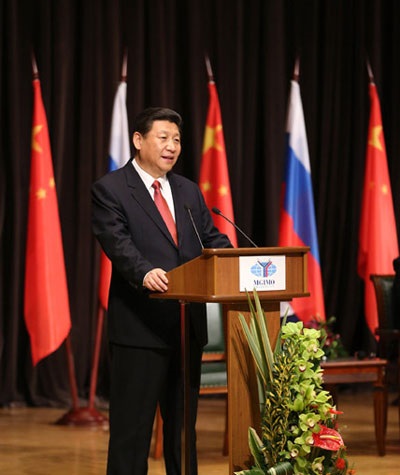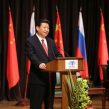
Out with the New, In with the Old: Interpreting China’s ‘New Type of International Relations’
Publication: China Brief Volume: 13 Issue: 9
By:

During Chinese President Xi Jinping’s trip to the United States last year in February, he urged Beijing and Washington to “set a good example of constructive and cooperative state-to-state relations for countries with different political systems…an example that finds no precedent and offers inspiration for future generations.” Then the acknowledged leader-in-waiting, Xi emphasized the importance of building “a new type of relationship between major countries in the 21st century”—a phrasing that would become “new type of great power relations” (xinxing daguo guanxi) (Ministry of Foreign Affairs, July 20, 2012). Last year, this phraseology could have been an opening answer, subject to negotiation, to then-Secretary of State Hillary Clinton’s challenge to write a new story about “what happens when an established power and a rising power meet” (U.S. State Department, March 7, 2012). Xi Jinping’s speech in Moscow during his first overseas trip as president and the subsequent elaboration of a “new type of international relations” (xinxing guoji guanxi), however, suggests Beijing is putting forth a new idea about the international system that challenges at least some of the tenets of the existing order (International Herald Leader, April 11; People’s Daily, March 23).
Following Xi’s first mention of the need to recalibrate U.S.-China relations toward a more positive vision of great power relations, his predecessor Hu Jintao elaborated four sets of actions both sides needed to continue. They were assuage mistrust through senior-level dialogues and regular communications among principals; continue and expand win-win cooperation in traditional fields, such as law enforcement, and non-traditional fields, such as energy and the environment; minimize the impact of outside factors and third parties on the U.S.-China relationship; and share international responsibilities to maintain a “healthy interaction” in the Asia-Pacific (Xinhua, June 20, 2012).
Shortly thereafter, Cui Tiankai, then-Vice Minister of Foreign Affairs and now Chinese Ambassador to the United States, along with co-author Pang Hangzhao provided a lengthy and official elaboration of a “new type of great power relations.” Cui and Pang unsurprisingly echoed Xi and Hu’s basic framework, but highlighted at least three obstacles to achieving this new vision for U.S.-China relations. The first was strategic mistrust. The second was conflicts over China’s “core interests” or, rather, U.S. interference in those interests. The third was brewing competition in the Asia-Pacific (Ministry of Foreign Affairs, July 20, 2012).
Although Beijing and Washington both had important roles to play in managing a “new type of great power relations,” Cui and Pang placed the responsibility for resolving the aforementioned problems squarely on the United States. China’s commitment to the U.S.-China relationship, as always, was never in doubt. They wrote “what the United States has done in matters concerning China’s core and important interests and major concerns is unsatisfactory.” In most respects, according to Cui and Pang, Beijing was not part of the problem: “There have been some problems recently in China’s neighborhood. China is not the maker of these problems, and still less the perpetrator of the harm. Rather, it is a victim on which harm has been imposed” (Ministry of Foreign Affairs, July 20, 2012). Overall, the message appeared to be a statement that Washington needed to accommodate China’s rise without reciprocal Chinese concessions to similarly long-standing U.S. principles and policies (“China’s Search for a ‘New Type of Great Power Relationship’,” China Brief, September 7, 2012).
At the Moscow State Institute of International Relations late last month, Xi gave a speech where he called upon the world to observe a “new kind of international relations” with win-win cooperation and common development at the core. The latter means countries must respect each state’s right to pursue its own political and economic development. Xi noted the world’s increasing interdependence and non-traditional security threats meant that states should not pursue security unilaterally, but should rely on cooperative security, collective security and common security (hezuo anquan, jiti anquan and gongtong anquan) to address their threat environment (People’s Daily, March 24). Although it would be easy to dismiss these comments as rhetorical flourish, they have since been picked up and elaborated on in other media outlets with varying degrees of authoritativeness.
The most recent and authoritative explanation came in a “Voice of China” (zhongsheng) editorial run earlier this week, coinciding with the visit of Chairman of the Joint Chiefs of Staff General Martin Dempsey. The article also specifically quoted Xi’s Moscow address, reprinting some of the same language even when not quoting the speech directly. In an interdependent global village, Zhongsheng argued, security comes from cooperative measures and allowing other states space for their security, rather than unilateral measures (People’s Daily, April 23).
An unsigned editorial, entitled “Xi’s Security Outlook,” published after Western media speculation about whether Xi rebuked North Korea in his speech to the Boao Forum explained the president’s comments on security in interdependent world thusly:
“This new concept of shared security is in stark contrast to the parochial approach, which tends to view security based on one’s own interests and needs. Driven by such an undesirable approach, a country will always calculate its own gains first whenever there is a regional or global security crisis. From the Syria crisis to maritime territorial disputes in the East and South China seas, in the final analysis many of the world’s security woes today can, one way or another, be traced back to the pursuit of selfish gains in disregard of regional and global security needs” (China Daily, April 10).
Qu Xing, a scholar with the Ministry of Foreign Affairs-run think tank China Institute of International Studies, also elaborated on President Xi’s remarks in an interview with the International Herald Leader that was redistributed through Reference News (Cankao Xiaoxi). Qu explained that the “new type of great power relations” was only one integral if subordinate component of the larger “new type of international relations.” The focus of the great power-version, according to this scholar, was eliminating the curse of conservative, established powers, initiating competition to prevent peaceful development. Perhaps most interestingly, Qu said engaging Russia, which he considers an influential great power, under Xi’s rubric should pull Washington toward greater acceptance of Chinese positions and better bilateral relations—an updated form of triangulation even if China does not pursue a formal security agreement (International Herald Leader, April 11).
The evolution of “new type of great power relations” into “new type of international relations” signals Beijing is doubling down on its past principles of foreign policy. At a time when Chinese scholars and public intellectuals are advocating a different approach to some of Beijing’s biggest foreign policy problems and principles, President Xi seems to be sticking to the old path (Foreign Policy, April 23; “Is Enough Finally Enough for China and North Korea?” China Brief, March 15). Even though Xi’s statements about contributing to collective security are a nod in the right direction, the view of sovereignty and the need to allow state’s their space echo the League of Nations rather than the United Nations. Under the former, sovereignty was absolute; under the latter, sovereignty is conditional. The best way to characterize this would be that a “new type of international relations” is a small step forward for China, but a step backward for the international community.





